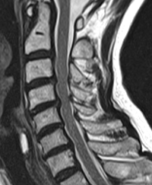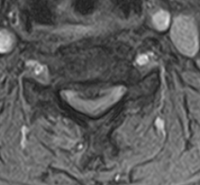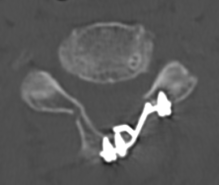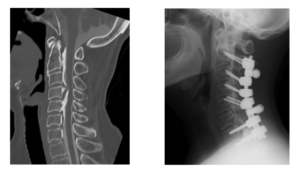Cervical Spondylotic Radiculopathy and Myelopathy (Cervical Myelopathy)
2022年5月4日
最終更新日時 :
2024年11月8日
 webmaster
webmaster
We will provide information on surgical methods, length of hospital stay, and insurance coverage for cervical spondylotic radiculopathy and cervical spondylotic myelopathy (cervical myelopathy).
If you need further information or have specific questions about these medical conditions or their treatments, please feel free to ask.
If you need further information or have specific questions about these medical conditions or their treatments, please feel free to ask.
Cervical Spondylotic Radiculopathy・(Cervical Myelopathy
What is Cervical Radiculopathy and Cervical Myelopathy?"
condition of the cervical vertebrae (neck bones) or intervertebral discs, leading to the growth of bony outgrowths called bone spurs or osteophytes, as a result of aging."
symptoms
When bone spurs compress nerve branches (nerve roots), it can lead to pain in the shoulder area and upper limbs. Numbness or pain in the hands and legs, motor weakness, and urinary dysfunction may occur, raising suspicion of spinal cord compression, making early examination essential.
treatment methods
We need to examine the location and size of bone spurs using X-ray images and assess the extent of spinal cord and nerve symptoms as well as spinal deformities using MRI or CT scans.
In cases of mild numbness, sensory disturbances, or pain, observation with medication therapy may be an option. However, if these symptoms do not improve and are accompanied by motor weakness or muscle atrophy, surgery becomes necessary.
In cases of mild numbness, sensory disturbances, or pain, observation with medication therapy may be an option. However, if these symptoms do not improve and are accompanied by motor weakness or muscle atrophy, surgery becomes necessary.

Surgical methods
Surgery is categorized into anterior approaches (anterior decompression and fusion) and posterior approaches (spinal canal expansion) depending on the size and location of factors compressing the spinal cord. Additionally, in cases where there is instability such as slippage of the cervical vertebrae or malalignment, fusion procedures may also be necessary. In all cases, these are highly specialized surgeries, so please consult with our hospital.




